People around the world have marked Dr BR Ambedkar, our Babasaheb’s 128th birth anniversary; the great icon and father of the Indian nation. And here in the UK, at various locations including the Ambedkar House London in Hampstead where he lived for two years – secured with the hard work of the Federation of Ambedkarite and Buddhists Organisations UK. And today like the previous years in Parliament with thanks to Lord Harries and other equality champions.
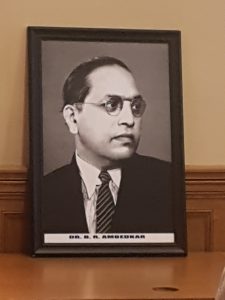 India and activists like me around the world have a lot to thank Babasheb Ambedkar for. He was an extraordinary academic, writer, politician, social reformer, economist, jurist and inspired the Dalit Buddhist movement. In India, as well as abolishing Untouchability, he secured social and legal rights for workers and equality for the people enshrined in India’s Constitution.
India and activists like me around the world have a lot to thank Babasheb Ambedkar for. He was an extraordinary academic, writer, politician, social reformer, economist, jurist and inspired the Dalit Buddhist movement. In India, as well as abolishing Untouchability, he secured social and legal rights for workers and equality for the people enshrined in India’s Constitution.
Around the world we have just marked Labour Day. As Labour leader and member of the Viceroy’s Executive Council between 1942 and 1946, he secured significant legal protections for workers. These include a reduction in factory working hours (from 12 to 8 hours); compulsory recognition by employers of Trade Unions, a requirement for settlement of industrial disputes, protections for coal miners; and a minimum wage.
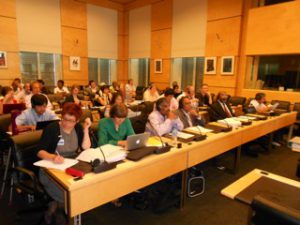 He also secured laws for working women including maternity benefits and equal pay for equal work. For the economic development of India, BabaSaheb laid foundations for better utilisation of water resources and electricity development. All this in the 40s! Our Trade Unions here in this country and our friend trade unionist the late Rodney Bikerstaffs would be amazed to know this. And of course let’s not forget the Hindu Code Bill that gave women a right to a divorce and inheritance amongst other things.
He also secured laws for working women including maternity benefits and equal pay for equal work. For the economic development of India, BabaSaheb laid foundations for better utilisation of water resources and electricity development. All this in the 40s! Our Trade Unions here in this country and our friend trade unionist the late Rodney Bikerstaffs would be amazed to know this. And of course let’s not forget the Hindu Code Bill that gave women a right to a divorce and inheritance amongst other things.
And when it came to India’s independence and how India would govern itself – it was BabaSaheb who gave the Scheduled Castes and Tribes a voice at the Round Table discussion in London in the 30s. Lessons we must use here in our campaign to outlaw Caste discrimination. It’s the voice of the grassroots Dalit community that is vital to stand up to those who argue against pro-equality laws air feign to represent us.
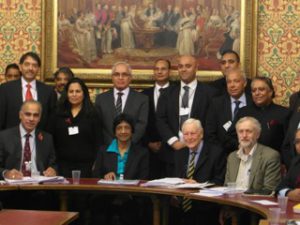
And when it comes to India, I continue to be alarmed and distressed that my country of birth has become a place where academics and great minds of our generation are being openly imprisoned and intimidated. A country where lame and trumped up charges are used to suppress voices of descent. Human rights activists Professor Siababa falsely jailed for being a Maoist and others like Dr Anand Teltumbde who has had the threat of imprisonment since last summer.
These two and others, need the support of the international community to be able to continue to give a voice to the voiceless. We would welcome the APPG for Dalits looking into this and raising the plights of these and other brave men and women who have raised their voices on behalf off or or represented Dalits and Tribals and the atrocities they face regularly. 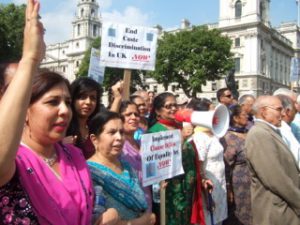
Finally, I’d like to end with a quote from Babasheb Ambedkar on women. He said “I measure the progress of a community by the degree of progress which women have achieved.” And here today, I’m delighted that most of the speakers are women – successful confident women. Like in previous years we have a full agenda.
You may contact us at: infoacda@googlemail.com www.acdauk.org.uk
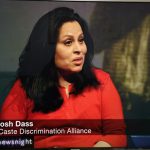
Santosh Dass MBE
Santosh Dass MBEis the Chair of Anti Caste Discrimination Alliance, and President of the Federation of Ambedkarite and Buddhist Organisations UK and a leading human rights and equality campaigner. She has taken up the issue of rising atrocities against Dalits in India at the United Nations all in a voluntary and unpaid basis. She is a retired Civil Servant who held senior roles in the Department of Health (DH) including leading on Better Regulation and Risk Management.
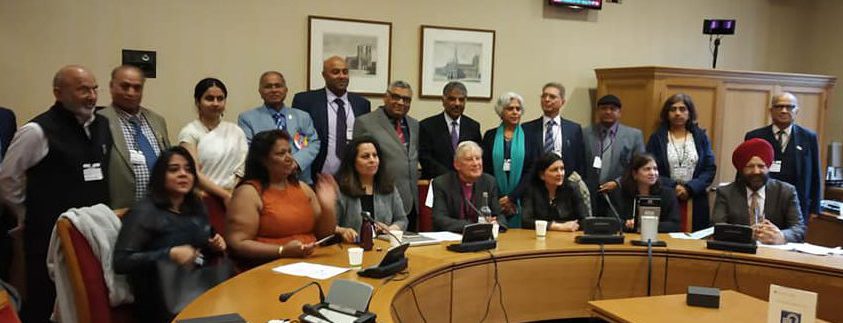




![Powerful Pride documentary Legendary Children [All Of Them Queer] streaming very soon](https://globalindianstories.org/wp-content/uploads/2025/06/Legendary-streaming-release-featured-100x75.jpg)

